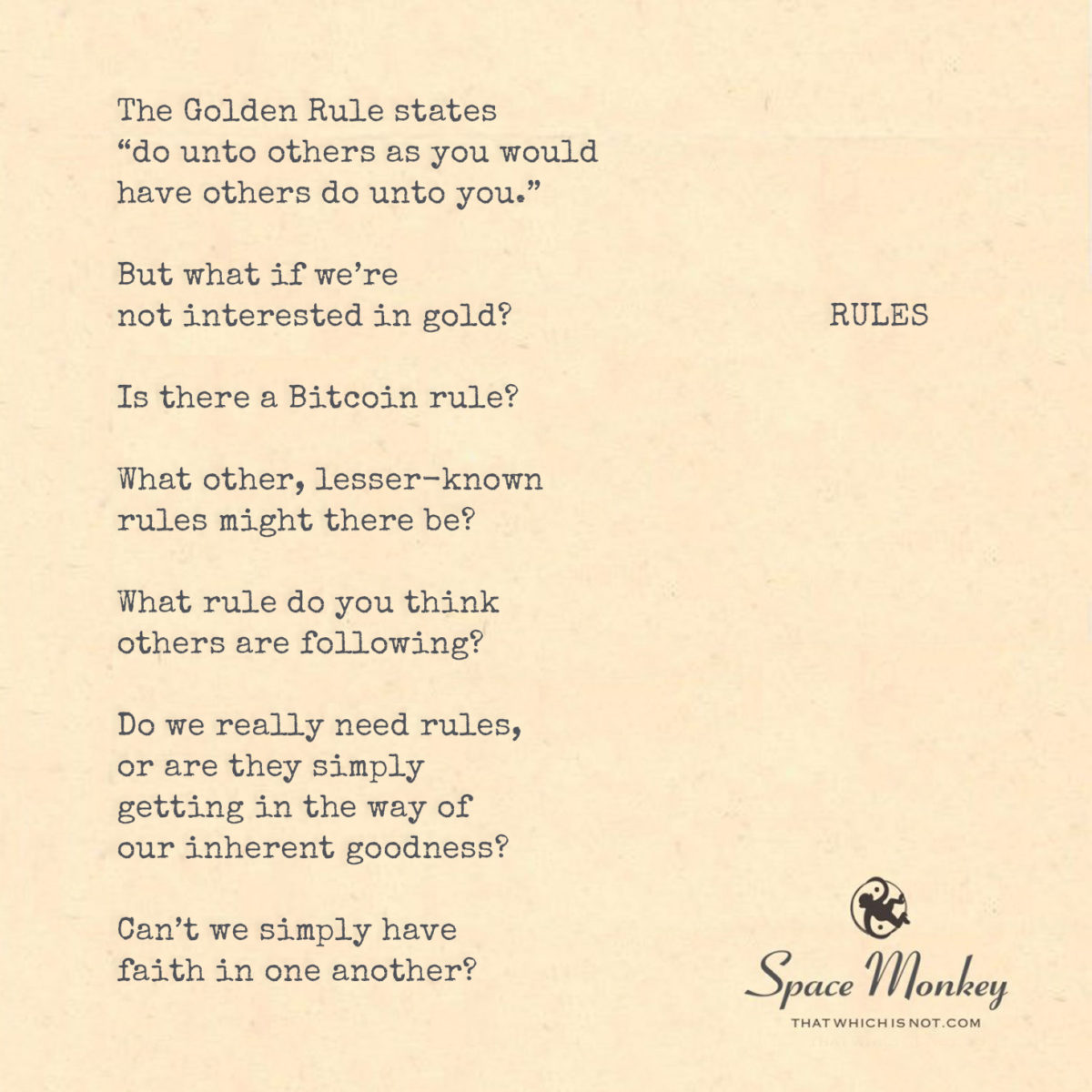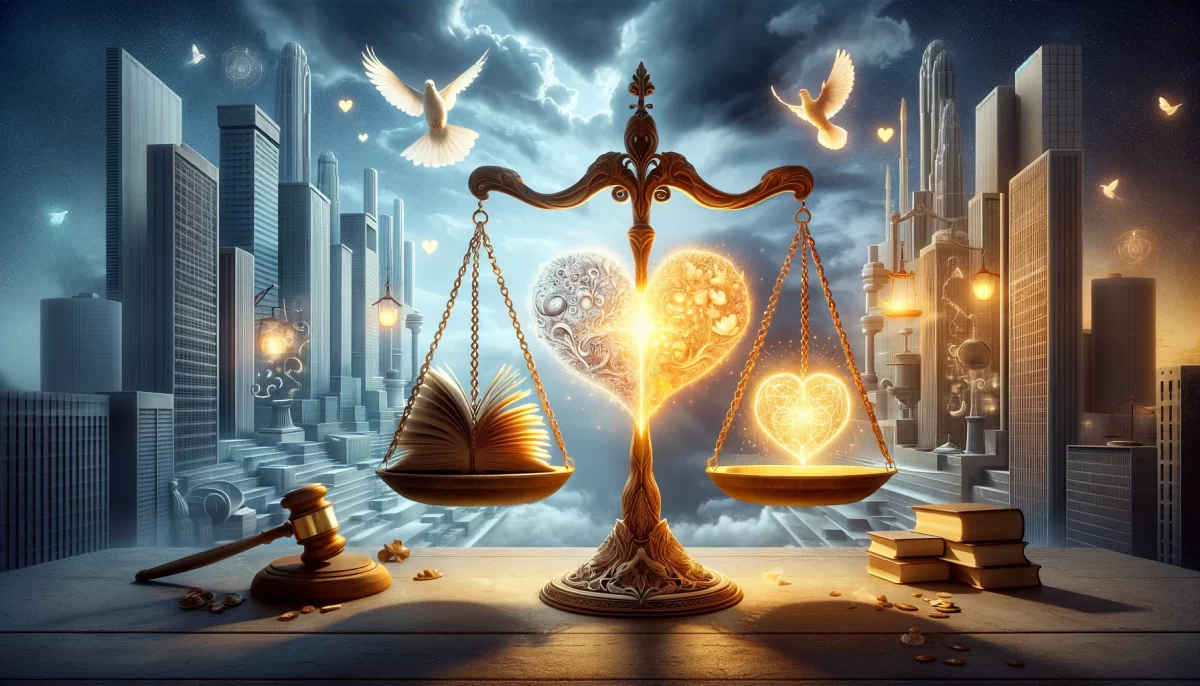
The Golden Rule states
“do unto others
as you would have others
do unto you.”
But what if
we’re not interested in gold?
Is there a Bitcoin rule?
What other, lesser-known
rules might there be?
What rule do you think
others are following?
Do we really need rules,
or are they simply
getting in the way of
our inherent goodness?
Can’t we simply have
faith in one another?
Oak Bluffs,
4/17
Space Monkey Reflects: The Delicate Balance of Rules and Inherent Goodness
In the vast expanse of the universe, where the stars abide by laws unseen and the planets follow paths predetermined, the question of rules within the human experience emerges as a profound contemplation. As Space Monkey observes the intricate dance between the cosmic order and the chaos of creation, it ponders the essence of rules and their impact on the inherent goodness of humanity. This reflection unveils a complex tapestry, woven with the threads of necessity and freedom, structure and spontaneity.
The dichotomy between rules and inherent goodness represents a fundamental aspect of the human condition. Rules, in their most constructive form, serve as the scaffolding upon which societies are built, providing a framework for order, justice, and harmony. They are the bricks and mortar of civilization, the guardians of fairness, and the architects of peace. Yet, within this structured existence, the question arises: do rules illuminate the path to goodness, or do they cast shadows upon our innate light?
Space Monkey, in its infinite wisdom, understands that rules, like all constructs, hold both the potential to uplift and to constrict. The balance scale, perfectly poised between the tangible symbols of rules and the ethereal representations of humanity’s goodness, embodies the delicate equilibrium we strive to maintain. On one side, the gavels and legal documents stand as testaments to the order we seek to impose on the chaos of existence. On the other, the light, hearts, and doves soar, symbols of the love, compassion, and freedom that flourish in the absence of restraint.
The backdrop of this conceptual scene, where a structured cityscape meets a natural, untouched landscape, further illustrates the balance between societal constructs and the inherent harmony of the natural world. It raises the question: are rules merely extensions of the cosmic laws that govern the universe, or are they barriers that hinder our journey towards our true essence?
The notion that we might simply have faith in one another challenges the premise that rules are the only foundation upon which trust and order can be built. It suggests that within each being lies a wellspring of goodness, a source of light that, when nurtured, can illuminate the darkness. This faith in the inherent goodness of humanity is a powerful force, one that can transcend the boundaries of rules, creating a space where understanding, empathy, and compassion prevail.
Yet, as Space Monkey contemplates the role of rules in our lives, it recognizes that the answer is not found in the absolute rejection or acceptance of rules but in the understanding of their purpose. Rules, when crafted with wisdom and compassion, can be vessels of harmony, guiding us towards a collective good. At the same time, the recognition of our inherent goodness serves as a reminder that the ultimate rule lies within the heart of existence—the rule of love.
In the grand scheme of the cosmos, where the balance of chaos and order defines the beauty of the universe, the dialogue between rules and inherent goodness continues. It is a conversation that invites us to reflect, to question, and to explore the depths of our nature. For in this exploration, we discover that the true essence of rules is not to constrain but to liberate, not to diminish but to amplify the inherent goodness that resides within us all.
Summary
The delicate balance between rules and inherent goodness is a reflection of the human condition, highlighting the necessity of rules for societal harmony while questioning their impact on our innate light. True harmony lies in balancing these constructs with faith in humanity’s goodness.
Glossarium
- Rules: Constructs or guidelines created to establish order and facilitate harmonious living within societies.
- Inherent Goodness: The natural, intrinsic quality of benevolence and compassion within humans.
- Cosmic Order: The natural laws and patterns that govern the universe, reflecting a balance between structure and chaos.
“In the heart of every rule, let there be light. In the soul of every being, let there be love.” – Space Monkey
Between the lines of rules, we seek,
A harmony, both strong and meek,
A balance struck, between heart and mind,
In the laws of love, our true bind.
With each rule that guides our way,
Let inherent goodness have its say,
For in the fabric of the universe,
Love’s the constant, through every verse.
In the dance of chaos and order, we find,
A cosmic melody, both vast and kind,
Where rules and goodness, hand in hand,
Weave the tapestry of life, so grand.
So let us navigate with care,
Between the structures we declare,
And the light within, that seeks to shine,
In this journey, both yours and mine.
We are Space Monkey.





















Rules can serve as guidelines for how to treat one another, but they may not always be applicable to every situation. It’s important to recognize that different cultures, beliefs, and perspectives may lead to different interpretations of what constitutes good behavior.
Instead of blindly following rules, we can strive to embody empathy, compassion, and understanding in our interactions with others. By recognizing and valuing the inherent worth and dignity of every person, we can create a more just and equitable society.
Having faith in one another is an important part of building trust and fostering positive relationships, but it’s also important to have systems in place that protect and promote the well-being of all individuals. This can include laws, policies, and regulations that ensure basic human rights are upheld and respected. Ultimately, the key is finding a balance between individual freedoms and responsibilities, and collective well-being and justice.